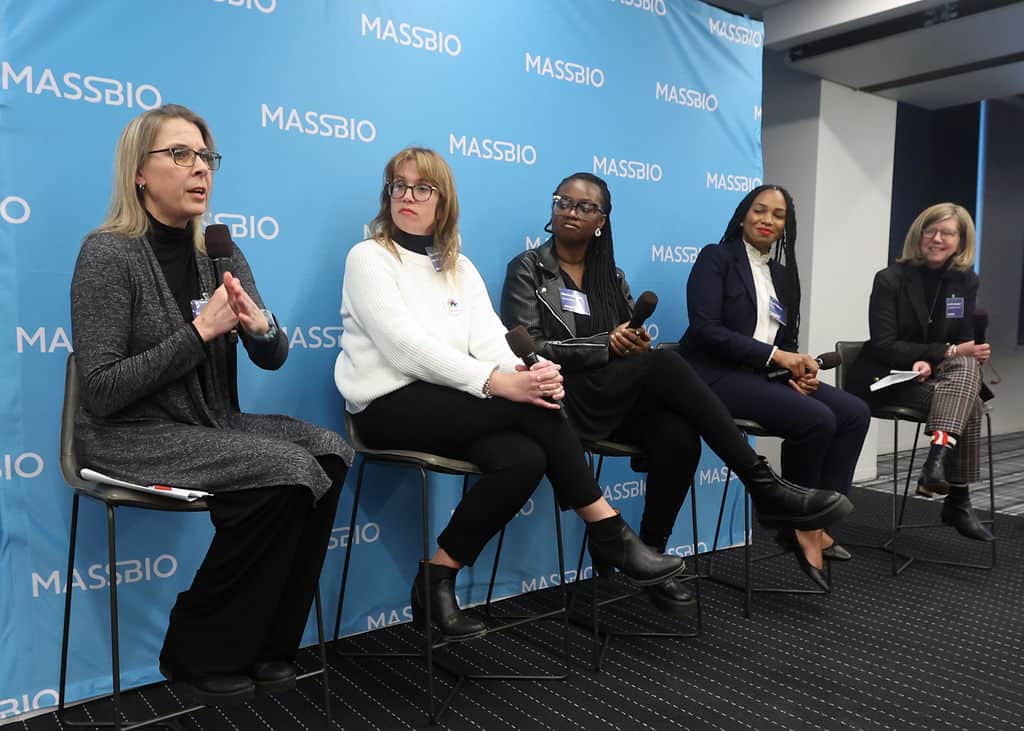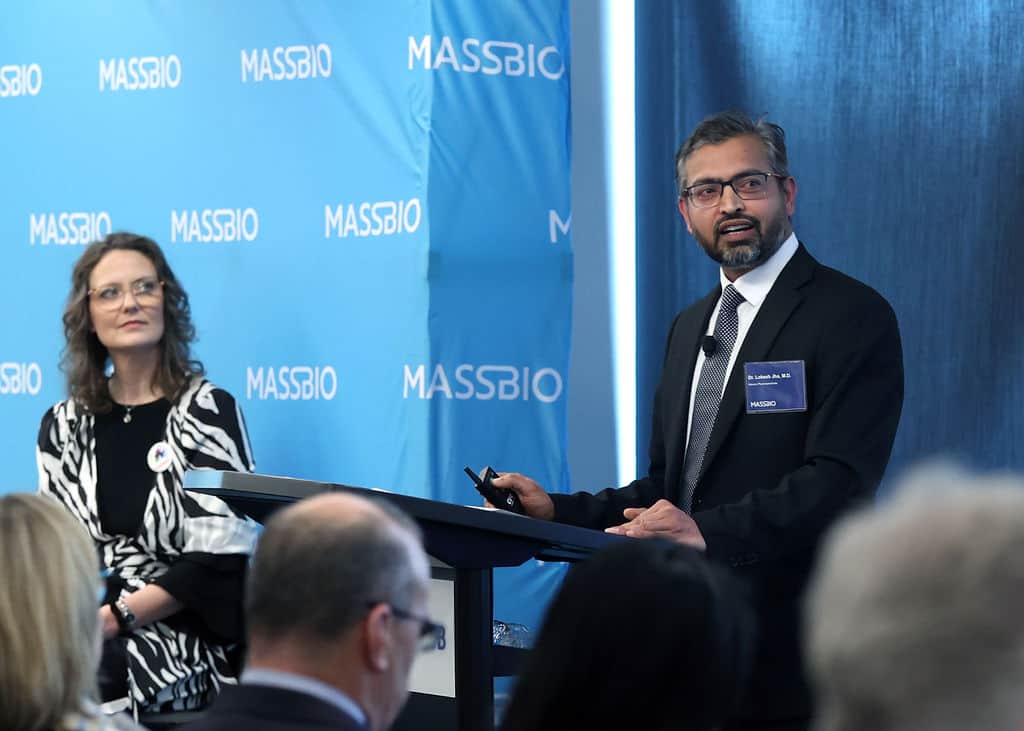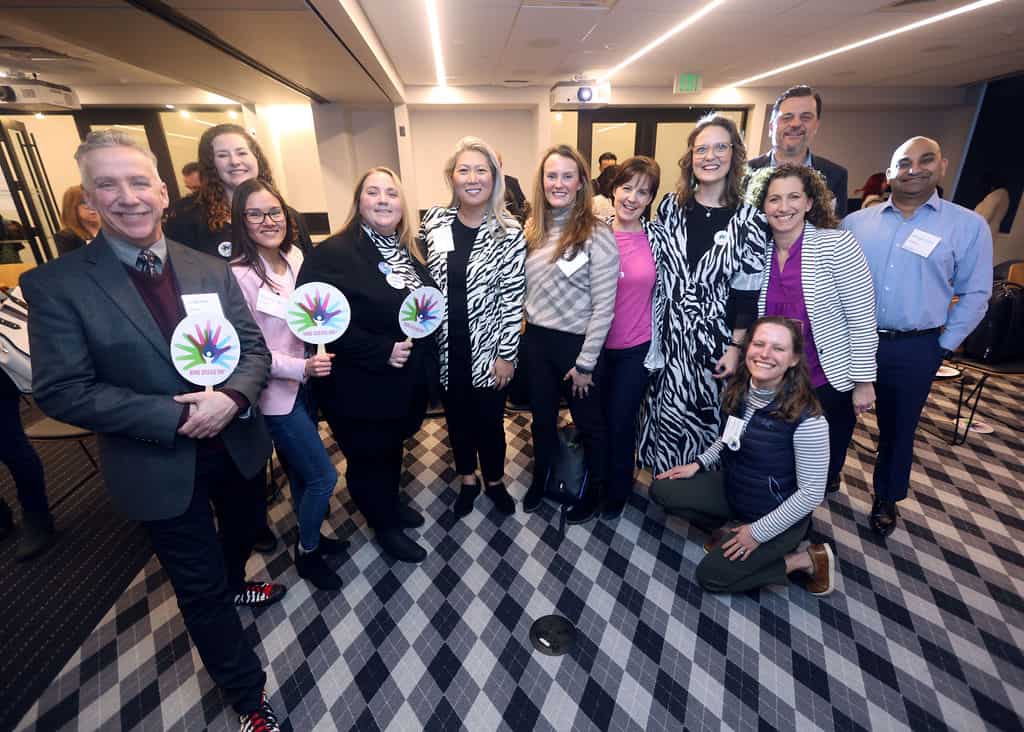Rare disease patients, medical experts, and advocates – sometimes with all of those roles overlapping – discussed the changing landscape of rare disease research and progress in a forum hosted by MassBio on February 29, sharing thoughts on the successes and frustrations of recent years.
The event, held each year on Rare Disease Day, is an important moment toward elevating public and industry understanding of rare diseases and the special challenges those facing them deal with on a daily basis. “We’re doing this for the warriors who walked this path before us, for those who are marching on it right now, and for those who will run down it in the future,” said Erin Frey, Senior Director of State Government Affairs for Ultragenyx and the emcee for the event.
While rare diseases are, by definition, “rare,” advocates stress they are much more far reaching than the name implies. Approximately 1 in 10 Americans have a rare disease, roughly 30 million people. Across the world, 300-400 million individuals live with a rare disease.
That means there’s a huge community of patients, advocates, medical professionals, and caregivers helping contribute to progress in the rare disease space, making those battling them feel less alone.

“Advocacy comes in many forms,” said Jennifer Siedman, director of community engagement at Courageous Parents Network, during a panel titled When Patients Become Leaders. Siedman’s own journey began when her son, Ben, was diagnosed with a rare disease, San Filippo syndrome, in the late-1990’s. The disease took his life at only 17 years old. But Ben’s life, and Jen’s experience advocating for him, became the inspiration for her life’s work and unwavering advocacy on behalf of other families touched by rare disease.
“Sometimes [advocacy] comes with a big ‘A,’ a capital ‘A,’” Siedman said. “That’s stuff like speaking at a conference or to Congress or doing some fundraising for research or participating in a clinical trial. But many times – and many, many times it’s the most important – it comes with a little, tiny, ‘a.’ Learning how to vocalize what you need to your clinician or simply reaching out to another rare disease family so they feel less alone. Or maybe it’s just wearing your son’s favorite rare disease socks on Rare Disease Day,” she said, lifting up her pant leg to show off her socks.
Takeda Senior Manager of Patient Community and Education Chaeli Wallace brought home the importance of advocacy from a young age when she discussed seeing her mother – who has the same rare genetic disease she does – being intubated and medical professionals getting ready to give her Benadryl.
“She was allergic to Benadryl,” said Wallace, who was just five at the time. “But I knew they weren’t listening to me. That was a tough moment, but it empowered me to keep fighting.”
Panelist Olaide Adekanbi echoed the frustration of not feeling in control as a patient with sickle cell disease.
“A lot of people don’t have the knowledge of sickle cell and how to treat sickle cell patients,” she said. “You’re dealing with layers upon layers of stigmas and perceptions. [There’s] this feeling of, ‘I’m not driving this, [and] we’re not going anywhere.’”
Most of all, panelists emphasized that there’s power in numbers and in reaching out to others in the rare disease community, making those who are new to it feel a sense of empowerment and solidarity.
“I work a lot with my disease community,” said advocate Amy Brown. “I write letters to Congress, representatives in my state, donate my blood to pharmaceutical companies. I stick out my arm and say, ‘Take it.’ I do anything I can.”
“The more I started to tell my story to larger groups of people and people who were generally interested and wanted to learn…I started to see how much that story meant and how much they could learn from it,” added Rare New England Board Member Tasia Rechisky. “I always said if I could leave somebody better off from telling my story one time and give them a piece of information they didn’t have, that is a success for me.”
Connecting these lived experiences to the medical community is a large part of rare disease advocacy.

Dr. Lokesh Jha, M.D., executive director and therapeutic area lead in medical affairs at Alexion and AstraZeneca Rare Disease, underscored the idea that it can take years for rare disease patients to receive an accurate diagnosis. The average time for an accurate diagnosis is 4-5 years. The reasons for this vary, Dr. Jha said, from lack of awareness and disease definition to lack of centralized infrastructure and geographically dispersed patients.
“It is a wide range of disorders,” Jha said during his Possible Talk®. “And all the patients present so differently in terms of their clinical science and symptoms that it is very difficult. You just cannot pinpoint one root cause of a disease.”
But despite those difficulties, progress is being made.
MassBio CEO and President Kendalle Burlin O’Connell kicked off the event with remarks highlighting the U.S. Food and Drug Administration’s December approval of two milestone treatments for sickle cell disease, which impacts around 100,000 people in the U.S. alone. The treatments were created by Boston’s Vertex Pharmaceuticals (with CRISPR Therapeutics) and Somerville’s Bluebird Bio.
“Massachusetts’ homegrown companies are bringing therapies and treatments to a patient community that had nothing,” Burlin O’Connell said. “Hopefully we’re going to see many more of those.”
The Commonwealth is not just home to companies bringing these treatments to patients, but also to advocacy groups that are looked at as an example for the rest of the country.
Dr. Dylan Tierney, M.D., chair of the Massachusetts Rare Disease Advisory Council (RDAC), spoke alongside council member State Rep. Jay Livingstone about the council’s work since its first meeting in late 2021.
“People look to Massachusetts,” Tierney said. “They’re really hoping that Massachusetts will show the way in [terms of] what an RDAC can do and that we can change lives.”
Members hope the council will come to be seen as a repository of resource information where those struggling to get a diagnosis can check with laypeople and the medical community to find information more quickly and accurately from others who have similar symptoms.
In a community that includes those suffering from diseases that are hard to diagnose and often harder to treat, there are no simple solutions. But MassBio leaders believe there’s no better place in the world for those with a rare diagnosis than here in the Commonwealth.
“For the rare disease community, we know the road is long,” said Burlin O’Connell. “The road is frustrating. The road can be lonely. But hopefully if you’re on that road in Massachusetts, you feel support and partnership on that road.”
